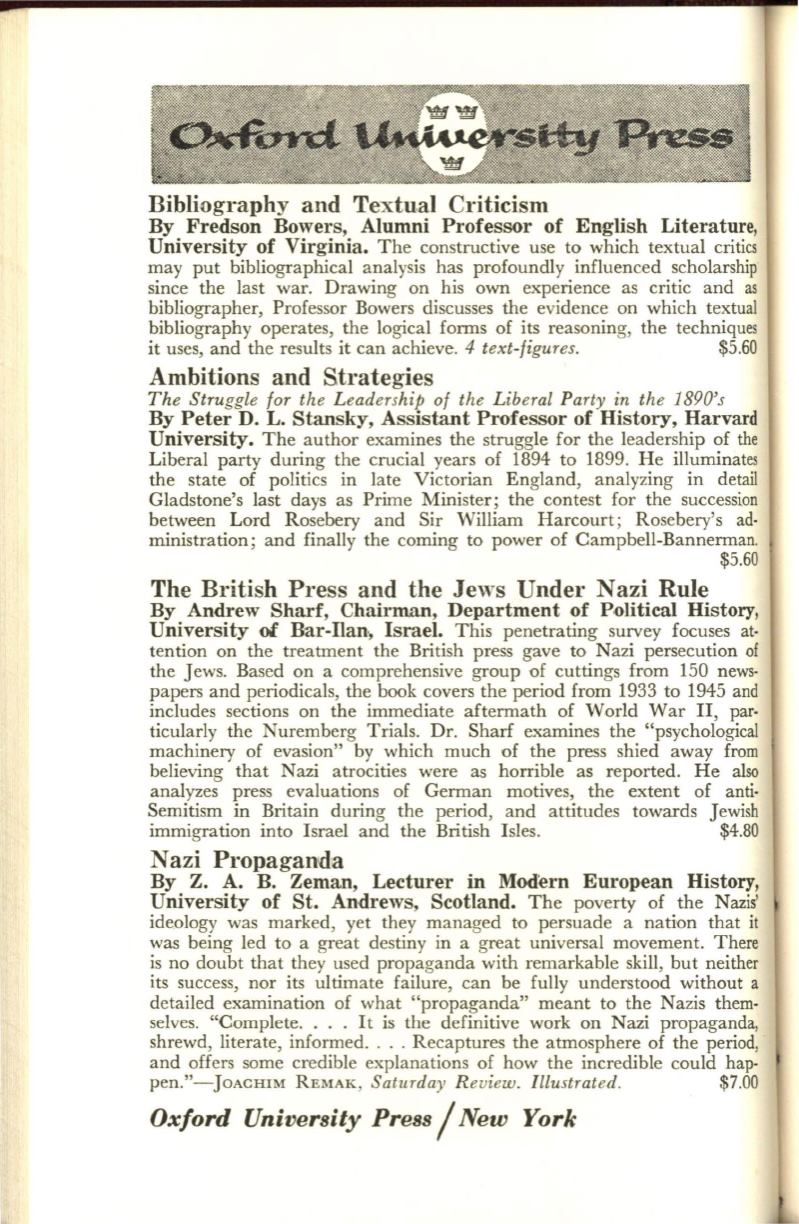
Bibliography and Textual Criticism
By Fredson Bowers, Alumni Professor of English Literature,
University of Virginia.
The constructive use to which textual critics
may put bibliographical analysis has profoundly influenced scholarship
since the last war. Drawing on his own experience as critic and as
bibliographer, Professor Bowers discusses the evidence on which textual
bibliography operates, the logical forms of its reasoning, the techniques
it uses, and the results it can achieve. 4
text-figures.
$5.60
Ambitions and Strategies
The Struggle for the Leadership of the Liberal Party in the 1890's
By Peter D.
L.
Stansky,
Assistant Professor of History, Harvard
University.
The author examines the struggle for the leadership of the
Liberal party during the crucial years of
1894
to
1899.
He illuminates
the state of politics in late Victorian England, analyzing in detail
Gladstone's last days as Prime Minister; the contest for the succession
between Lord Rosebery and Sir William Harcourt; Rosebery's ad–
ministration; and finally the coming to power of Campbell-Bannerman.
$5.60
The British Press and the Jews Under Nazi Rule
By Andrew Sharf, Chairman, Department .of Political HistQry,
University of Bar-nan, Israel.
This penetrating survey focuses at–
tention on the treatment the British press gave to Nazi persecution of
the Jews. Based on a comprehensive group of cuttings from
150
news–
papers and periodicals, the book covers the period from
1933
to
1945
and
includes sections on the immediate aftermath of World War II, par–
ticularly the Nuremberg Trials. Dr. Sharf examines the "psychological
machinery of evasion" by which much of the press shied away from
believing that Nazi atrocities were as horrible as reported. He also
analyzes press evaluations of German motives, the extent of anti–
Semitism in Britain during the period, and attitudes towards Jewish
immigration into Israel and the British Isles.
$4.80
Nazi Propaganda
By Z. A. B. Zeman, Lecturer in Modern European History,
University of St. Andrews, Scotland.
The poverty of the Nazis'
ideology was marked, yet they managed to persuade a nation that it
was being led to a great destiny in a great universal movement. There
is no doubt that they used propaganda with remarkable skill, but neither
its success, nor its ultimate failure, can be fully understood without a
detailed examination of what "propaganda" meant to the Nazis them–
selves. "Complete. ... It is the definitive work on Nazi propaganda,
shrewd, literate, informed. . .. Recaptures the atmosphere of the period,
and offers some credible explanations of how the incredible could hap–
pen."- JoACHIM REMAK,
Saturday R eview. Illustrated.
$7.00
Oxford University Press
/
New York


